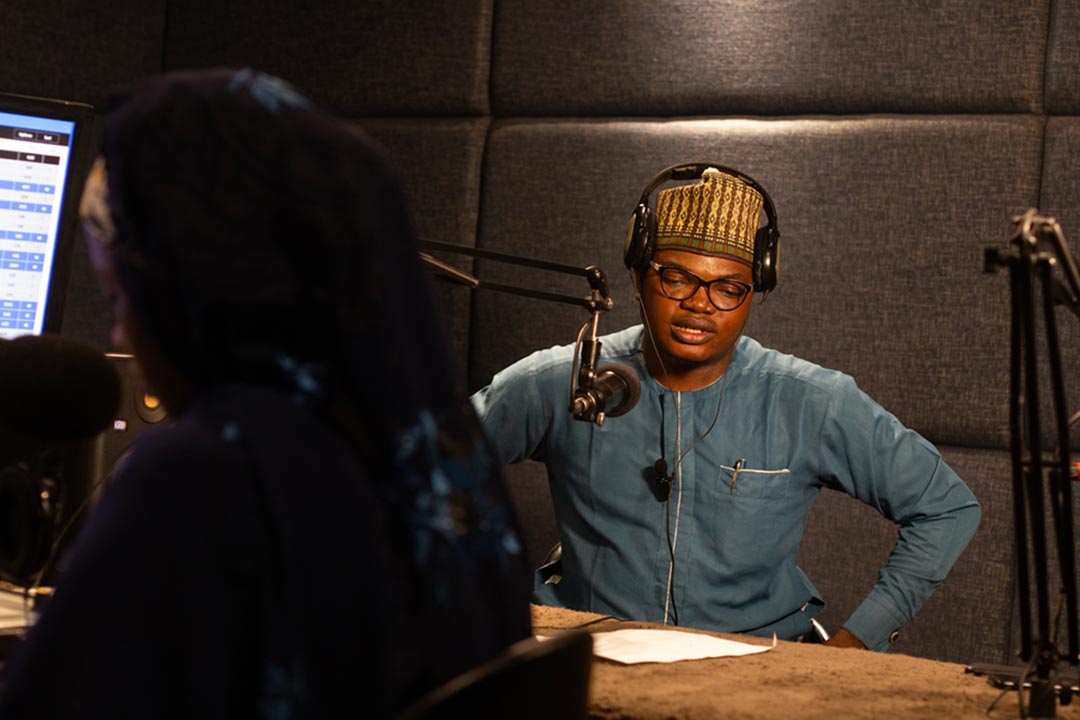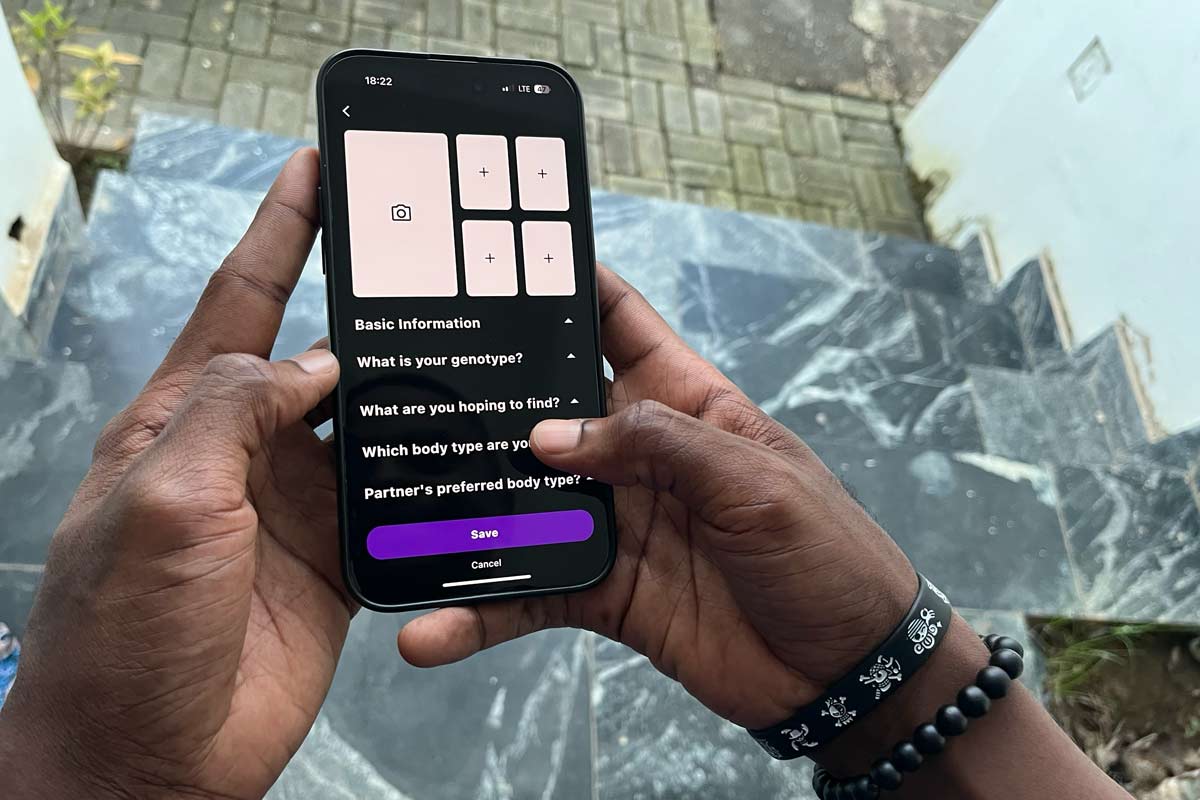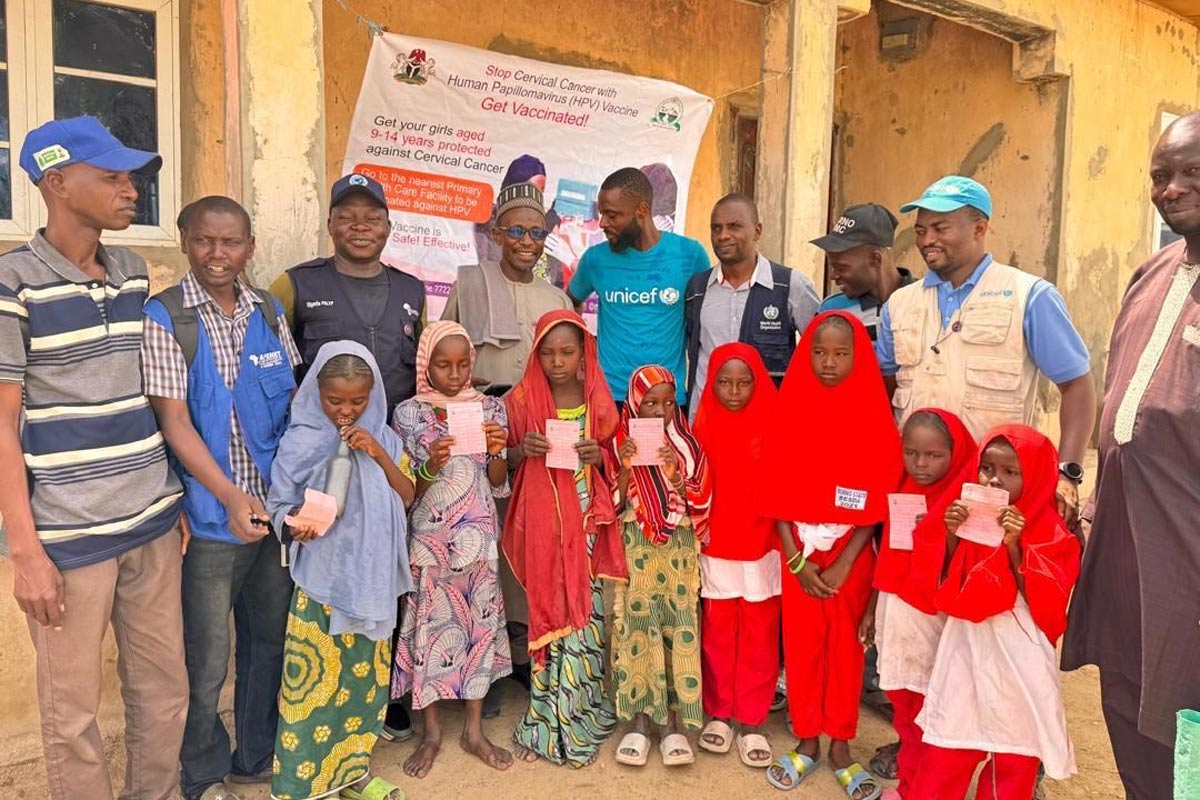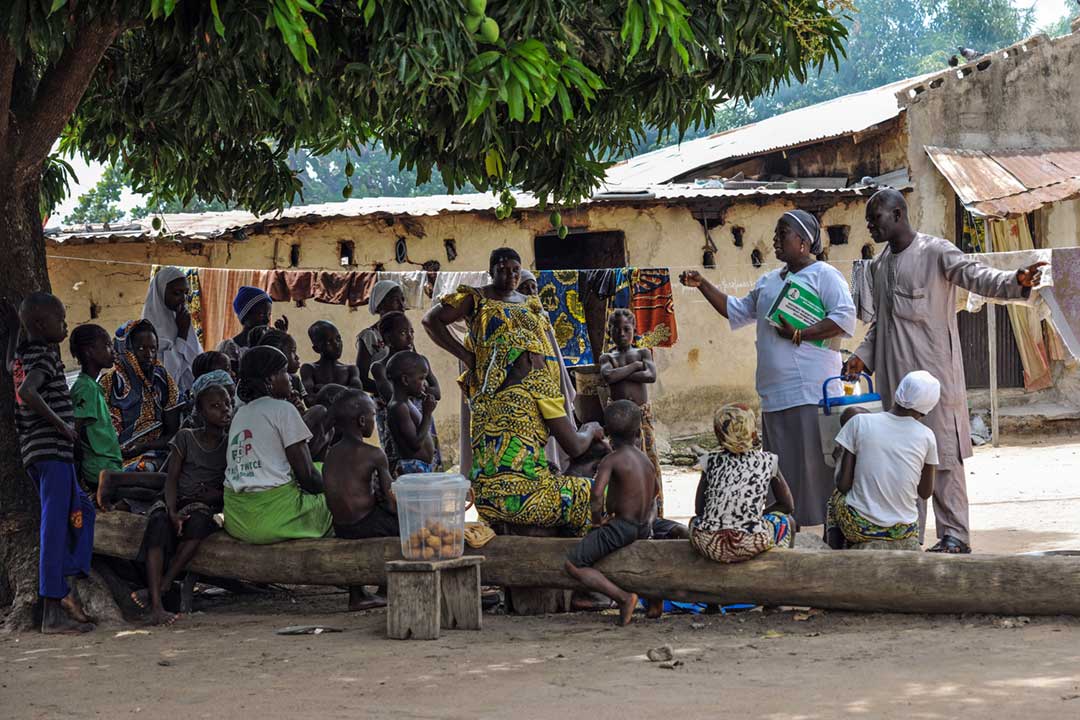This Nigerian's campaign for the HPV jab is a fight against more than cancer
Samuel Adeyinka has spent his adulthood fighting for better lives for the urban poor. His latest tool in that battle is the jab that blocks cervical cancer – an inequitable killer that preys most heavily on the disadvantaged.
- 23 November 2023
- 7 min read
- by Zubaida Baba Ibrahim

Every Thursday at noon, Samuel Adeyinka, 28, takes to the airwaves at Al-Ansar Radio in Maiduguri, the capital of Borno state, Nigeria. His mission is to increase awareness of cervical cancer and, more hopefully, of the cancer-blocking human papillomavirus (HPV) vaccine.
It's topical subject matter. On 24 October, Nigeria launched the HPV vaccine as part of its routine immunisation schedule. A phased, nationwide introduction is ongoing, meaning that over the course of the next year, it will become available free of charge to all Nigerian girls aged 9 to 14.
“It will be very effective for Nigerian women, for a cancer that we have found out we can actually prevent. Imagine 10 to 15 years from now: that is when the change will be felt.”
– Dr Ademola Oyekan, clinical oncologist
"Will the vaccine still be effective if I'm above 14 years of age?" a caller asks on Adeyinka's radio show.
"The vaccine [can be] effective for people of all ages," Adeyinka responds. "But the [age groups] 9 to 14 are just segregations based on the availability of the vaccines that Nigeria has been able to get."
On other days, Adeyinka travels from community to community and from school to school to carry out awareness talks with women and adolescent girls the jab. While the first volley of 16 states are rolling out the jab now, Borno expects to roll out the jab next year.
This preparatory moment is a crucial opportunity for activists like Adeyinka. "In communities, there is a lot of disinformation and a lot of speculation about vaccines," Adeyinka explains. "Having to understand why the COVID-19 vaccines' uptake was very low in some of these communities, our campaign is to make sure the vaccine uptake [for HPV] is high, and there is a level of acceptance."
8,000 women lost each year
Cervical cancer is the second-most common cancer affecting Nigerian women, according to the World Health Organization (WHO). In Nigeria, more than 12,000 women are diagnosed each year and approximately 7,968 die. In the vast majority of cases, cervical cancer is caused by HPV, which is extremely common, and transmitted by sexual contact.
But Dr Ademola Oyekan, a clinical oncologist, says the HPV vaccine should help change Nigeria's grim statistics. "It actually provides a cover for the population and reduces [women's] risk of coming down with prolonged HPV infections that evolve to cervical cancer."
"It will be very effective for Nigerian women," Dr Oyekan notes, "for a cancer that we have found out we can actually prevent. Imagine 10 to 15 years from now: that is when the change will be felt."
An extension of the vaccine to the male-child would help still further, "because it is the males that actually pass it on to the females," she says.
An unequal-opportunity killer
Like so many diseases, cervical cancer is an inequitable threat. As Dr Oyekan points out, the risk of dying with cervical cancer is higher among people with low socio-economic status. Studies have shown that rates of diagnosis with the cancer, as well as mortality rates from the cancer, are significantly lower in countries that score higher on the Human Development Index (HDI).
It's that prospect that spurred Adeyinka to set about raising awareness of the vaccine, especially in underserved and hard-to-reach communities.
Adeyinka is the founder of the Save the Slum Initiative, a non-governmental organisation (NGO) he set up in 2016, aged just 21. Starting its operations in the southwestern region of the country, in its second year, the organisation expanded its work to the north-central zone, including states like Nasarawa, Kogi and the Federal Capital Territory (FCT). By 2020, Adeyinka says the Save The Slum Initiative's scope included states in northeast Nigeria, especially Borno, Adamawa and Yobe, which have faced decade-long attacks by the Boko Haram terror group and its breakaway factions.
But the roots of the project remain deeply personal.
Born in Ijora-Badia, Adeyinka describes growing up in an underserved informal community in Lagos, a state in southwest Nigeria. "Growing up was a little bit tough," he says. "You know, being born in the slum is a disadvantage already."
Due to limited access to high-quality health care and other basic needs, like clean water and adequate housing, Adeyinka said that residents of his community had poor health outcomes. Although he and his family went relatively unscathed, he says he grew up seeing people suffer from preventable disease.
Have you read?
"I have seen where a lot of [health] issues had affected a lot of people in the slum, even tropical diseases like malaria and cholera," he explains. "So now, talking about HPV, you see that people in these slums don't even know what is wrong with them until it gets to a larger scale, because of low accessibility to screening and cancer awareness programmes.
"I remember a similar story from when I was growing up," Adeyinka recounts. "One of my cousins got cancer, but we didn't know anything about the type of cancer or how to manage it until she died. I later learned that my cousin had cervical cancer, which was caused by HPV."
Better health and better lives for the urban poor
In a nutshell, the Save the Slum Initiative is about improving the lives of the urban poor – and that has often included mobilising on matters of public health.
To reach the communities he serves, Adeyinka's identifies and engages with credible voices within those communities. "We do the community entrance first before we are accepted, and we talk to the chiefs, the religious rulers and the traditional rulers."
In most communities, people tend to listen willingly to their imams, sheikhs and traditional rulers, he notes, adding that some of these communities have exhibited a significant amount of vaccine hesitancy, including during the COVID-19 vaccination drive.
"You get a lot of people saying it [the vaccine] will kill their children or it is going to destroy their womb. But a very good strategy that we are going to put in place when it [the HPV vaccine] comes, after talking to credible voices, is to ask them to volunteer their houses as venues for the vaccination.
"Since the HPV vaccine is for girls between the ages of 9 to 14, we want to make sure that apart from the primary health care centres there should be mobile spaces in front of the chief's palace, and some of these chiefs' children are also taking the jabs. This is direct information to these people."
Adeyinka's strategy is informed, in part, by lessons learned during the COVID-19 vaccination campaign, when he observed a pattern of unequal access to vaccines. Some groups, such as people living in rural areas or those with limited access to transportation, were less likely to be able to get vaccinated.
“Growing up was a little bit tough. You know, being born in the slum is a disadvantage already.”
– Samuel Adeyinka
To ensure vaccine equity and accountability during the HPV vaccination roll-out, Adeyinka is working with local healthcare providers, hospital boards, and immunisation officers to create a system that is responsive to the needs of different populations. "Also how to be transparent and how to have a database of the distribution, the value chain and the likes," Adeyinka says.
Guarded optimism
With the vaccine launch date in Borno drawing nearer, Adeyinka says his campaign is progressing. He has been able to increase understanding and acceptance of the vaccine among the communities with a weekly average of 200,000 listeners on his radio programme alone, he notes.
"We anticipate a very high uptake because people are aware of the vaccine now," he says.
But there are still obstacles to overcome. One of them is a simple difficulty of communication in a region of many languages and dialects. "In communities, especially in local and hard-to-reach places, we have a lot of challenges in terms of language barrier.
"I can remember one we just finished in Borno state where we had to translate from English to Hausa, and from Hausa to Kanuri, from Kanuri to Shuwa," he says. "That is one of the things we are looking into when funding comes."









